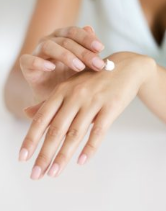
Our skin so important to us, and impacts our health in many ways. Experts who advocate sunscreen use consistently, but for patients with certain skin conditions, which makes the skin more sensitive and vulnerable to burn. Dr. Elbulk says that, “the ultraviolet, visible, and infrared light in sunlight can stimulate melanocytes, skin cells which create pigment known as melanin, to make more melanin that is what contributes to hyperpigmentation.” Sufferers should always use a broad spectrum SPF 30+, or a bodily sun blocker comprising zinc, titanium, or iron oxide to lessen the blow, we also recommended visiting a skin doctor for professional advice.
 Women with hair loss can colour their strands
Women with hair loss can colour their strands
Although it is tempting to take a minimalist approach to hair care when dealing with excess shedding and thinning, you can absolutely get a dye job. Permanent hair dyes are usually the best, give a natural appearance, and last longest. Since some people develop an allergic dermatitis to hair dyes if you get a rash after dying your hair, it is important to find a board-certified dermatologist to ascertain the cause.
You are already plugged in 24/7, why not rotate in the noises of skin-friendly radio? AAD Dialogues in Dermatology is the official podcast of the American Academy of Dermatology; subjects range from improvements in psoriasis into the direction of Zika Virus. “My job is to choose topics which are both current concerning breaking science–and regarding events in the world around us–that will also meet the needs of continuing medical education for our member dermatologists to keep their board certification,” says Shadi Kourosh, MD, Chair of the Communications Council for Women’s Dermatologic Society and editor-in-chief of the podcast.
Alternative medicine is all anyone can talk about
During the Q&A part of the day, one topic kept coming up: alternative therapies. No real surprise there considering edible beauty, by way of instance, appears to be all the rage. And while specialists in attendance agreed that there is not enough research on ingestible beauty (yet) with a healthy diet is the basis for enhancing any skin dilemma.
An impressive brand new acne medicine might be coming to you soon
Acne treatment and skin care is big business, with $2 billion spent yearly attempting to clear the pesky illness, it is not surprising that there is a new in-office treatment on the horizon. Sebacia utilizes gold-coated silicon microparticles, coupled with a laser, to obliterate acne-causing structures. And trials coming from Europe reveal a 50 percent decrease in eruptions only four weeks after use. “According to these European trials, this therapy appears to be safe for anybody with acne with a few exceptions,” says Kachiu Lee, MD, who specializes in cosmetic and general dermatology. “But, the wavelength of light that the laser uses to trigger Sebacia particles might not be safe for skin of color as it could possibly result in hyperpigmentation,” she adds. While there is no ETA for its touchdown in America, you can keep your eye on the brand’s site for upgrades. Meanwhile, try these proven acne remedies.
At-home remedies actually work, but there is a catch
You know those at-home beauty masks, which could double as a Darth Vader Halloween costume? Those actually do the job, based on WDS pros. In one randomized controlled study, an at-home acne laser device yielded a 50 percent reduction in inflammatory lesions versus 2 percent gain in the control group after 12 weeks. “Many at-home skincare treatments are simple to do, can function as an effective adjunct treatment to in-office remedies by a naturopathic dermatologist, spare sensitive people embarrassment as the process can be completed in the privacy of their home, and they’re relatively inexpensive,” says Susan C. Taylor, MD, Women’s Dermatologic Society Media Relations Committee Chair; and the bottom line is, if you are going to try out these DIY version, be consistent and commit to the long haul for the best results.
